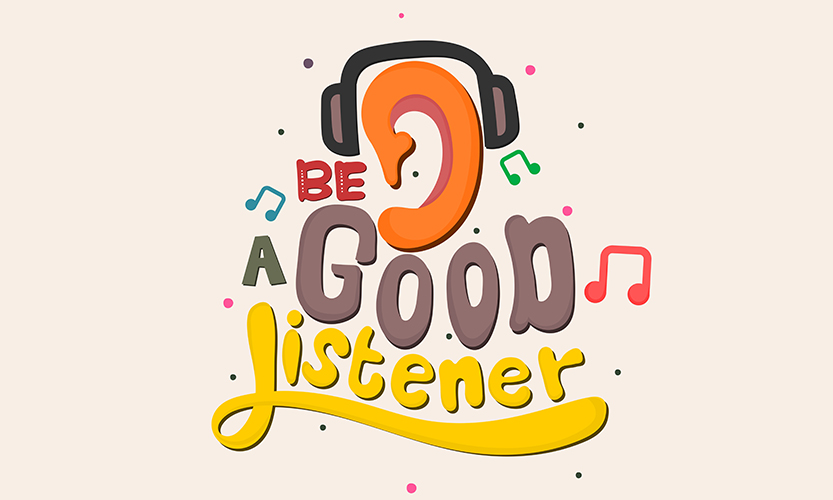Why should Salespeople talk less and get customers to speak more for success.

Selling entails a great deal of talking. Take a look at the jargon. Words like an elevator pitch, sales speak, catchphrase, winning script, and brand messaging would not dominate the conversation if communication wasn't so important. They do, though, since every day in sales, you have to make calls, develop proposals, give presentations, tell your story, negotiate terms, and persuade prospects.
However, despite its importance, chatting your way into a prospect's good graces isn't always successful. In reality, the science of selling advises that you should talk less and listen more to close more sales.
The advantages of speaking less
Speaking less to sell more may seem counterintuitive, but the reasons become evident if you examine the sales process. It's all about getting your point across in sales communication. However, this is only a partial image. After all, you're not the only one with a message. Your clients have one as well. And the news is probably far more significant to them than the one you spent many hours honing. That means you must build trust, rapport, and genuine concern for individuals to create an environment conducive to open communication – one in which prospects may honestly disclose all of their problems. Only then will you be able to hear, comprehend, and act on their message. The rewards accrue if you devote more time and effort to actively listening to your prospects. Among the most obvious are:

- You set yourself out with your brand.
By talking less and listening more, you might give the appearance that you're a cut above the rest of the salespeople who blab and regurgitate a script on this or that product. Furthermore, you draw attention to a fundamental similarity: you, like your consumers, believe that "sales" discourse is inauthentic and insults the intelligence of your audience.
- You obtain valuable knowledge and valuable insight.
The more your customers talk, the more helpful information you'll get. This could include information on their problems, objectives, operations, budget, and decision-making process. It could potentially contain information that the customer had not intended to share. Whatever the case may be, the more data you know on a customer, the more distinct value you can provide.
- You have less opportunity to make blunders.
You reduce your chances of making mistakes by limiting your conversation time. Some missteps are harmless and amusing, while others are serious, and a few are genuinely spectacular. It's far better to keep your mouth shut and lend your ears than to say something that would confuse your client or cause you to regret sharing later.
- You give prospects a sense of respect and worth.
People feel more comfortable expressing ideas, describing their needs, or delivering nasty but honest comments when you pay proper attention to them. Giving customers a way to express their problems to people responsible for listening provides the message that the company/brand cares about and values them in a sales paradigm.
- When it's your turn to talk, you command complete attention.
People frequently return gestures and emotions. When you begin a conversation with respect and active listening, prospects are more likely to reciprocate. When you define their problems and provide your product as a viable solution to their specific issues, they will pay attention. This benefit is critical to closing negotiations because conversion almost usually requires complete engagement.
- Improve your listening abilities to persuade more people to talk to you.
It's one thing to understand that listening more makes you a better seller. Another thing you may do is improve your active listening abilities. Here are some easy ways to increase your listening abilities and boost your conversation:
- Be sincerely concerned about other people's well-being and try to comprehend their perspectives.
- Ask open-ended questions to elicit the pain spots of the possibility.
- Instead of focusing (re: actively listening) on which script you need to repeat next, focus (re: actively listen) on what your customers are saying.
- Maintain clarity and conciseness in your contribution to the conversation.
- Make a mental note of everything.
- When you're going to mention something crucial, use the prospect's name periodically.
- When the conversation becomes unmanageable, slow down.
- When prospects are speaking, avoid interrupting them. When you need to introduce a key point or detail into the flow of ideas, demonstrate respect if you have to.
- Regularly paraphrase your prospect's words to confirm or explain any ambiguous areas. Always strive to articulate their issues more accurately than they do.
- Summarize and summarize the dialogue, and emphasize your call to action when appropriate.

Final Takeaway!
Selling something that people do not require is simply obnoxious. A professional and well-liked salesperson will not become desperate. Instead, a very cool sales professional is one who genuinely cares about their customers and is eager to assist and provide excellent answers. Listening to your prospects' needs and finding methods to help them qualifies you as a "classy sales professional" who understands when not to pitch. Selling success hinges on your ability to communicate your message.
However, based on factual information, salespeople should reframe various phrases and techniques to reflect the prospect's perspective. "Sales talk" may refer to how you explain the benefits of your product, but it should also include what your customers are saying. After all, sales people don't have control over the amount of time they spend talking. Customers are the ones who make decisions. "Communication" could refer to describing how your product or service solves a customer's problem. But it should also mean keeping your lips quiet and your ears open the majority of the time to have a meaningful conversation with them about their difficulties.
If you want to learn techniques of super sales conversations and want to know how to sell more effectively by talking less – ask our experts to organize a sales coaching session and take the advantage of the knowledge and expertise of ChalkWalk consulting. Write to us on info@chalkwalkconsulting.com.


Leave a Reply